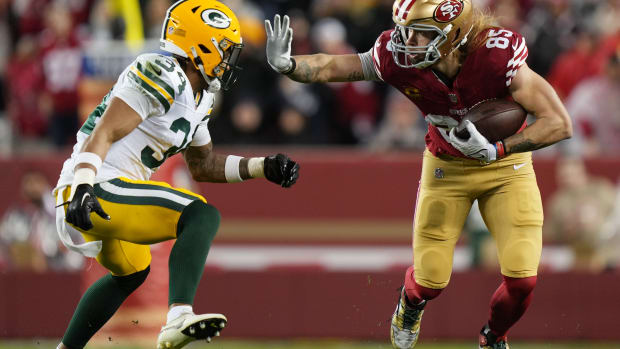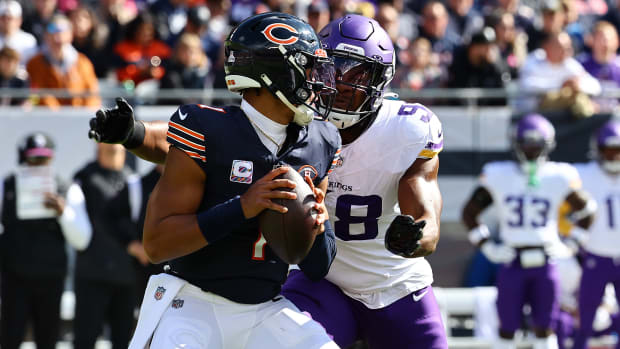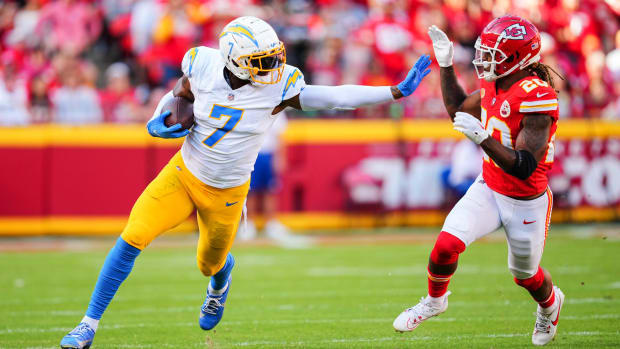Matt Nagy's Bears offense reverts to John Fox era numbers
Popular offseason theory placed the Bears defense in a position of regression under new coordinator Chuck Pagano, offset by a flourishing, rising offense in Matt Nagy's 200-level course.
It's been quite the opposite through a quarter of the season, in fact. The defense picked up its game even higher and the offense seems utterly stymied.
There has been no steady, incremental offensive improvement.
"But the best part about our team right now, the No. 1 stat that I care about, other than the wins and losses, is the turnover margin," Nagy said, sounding like John Fox or Lovie Smith. "We lead the league right now. We're plus-six, we’re tied with New England.
"And so we're getting the football away from our opponents and we’re not giving it back to them. As long as you keep get that trend going, you’re going to always have a shot at the end."
Sure turnovers are critical, but Nagy came to Chicago as the offensive savior. What happens when the turnovers don't come on defense, or the ball gets turned over? Green Bay 10, Bears 3 is what happens. Mitchell Trubisky's two red-zone interceptions are what happen.
They can make it easier on themselves with some offense. If they're only going to move the ball at the current pace, they'll need to eliminate all turnovers and that's not realistic.
The offense has barely had a pulse, and ranks 30th in the NFL. John Fox and Dowell Loggains left the Bears after 2017 with the offense ranked 30th.
Overall the Bears are 27th in scoring and the offense has accounted for 59 points. They were 21st in scoring last year.
The Bears are in London to face Oakland and the league has to hope they can produce at least a few big plays to excite the locals, who usually seem to like kicking plays more than they should.
Nagy admitted this week he's had a few late-night phone conversations with those he considers personal friends or advisors, presumably about the offense.
Coaches on that side of the ball insist they'll work through all of this.
"Anyone can hold the helm when the seas are calm," offensive coordinator Mark Helfrich said.
The popular scapegoat is Trubisky, but even when Chase Daniel played after Trubisky's injury some disfunction occurred.
Running Game Woes
The Bears keep falling behind the chains due to an inconsistent running attack. They rank 25th at gaining first downs because of failures on first- and second-down plays. They're averaging just 5.14 yards on first down, 23rd best.
This wasn't supposed to happen after they got rid of Jordan Howard and had their backs in place, David Montgomery and Mike Davis.
In Sunday's win, the Bears owned time of possession but still averaged 90 inches per rush, 2.5 yards.
"That's obviously not that great," Nagy said.
Over four games, they have four runs of 10 yards or more, and only two by a player who could really be called a running back. Montgomery made 12- and 14-yard runs.
"I'll go back to what we talked about Week 1 and Week 2," Nagy said. "What did I say? We're looking for more explosive plays. ... Those get you going."
It's not entirely Montgomery's fault, although he often appears to quickly abandon the blocking scheme before bouncing it outside. It's a quality they liked in Montgomery coming out of college, but at some point blocking at the point of attack has to be allowed to form.
"The run game, it wasn't as good as the pass protection (against Minnesota) but it was better than the week before," Nagy said. "And I think that's the challenge is making sure that this isn't a yelling and screaming match between (offensive line coach) Harry (Hiestand) and myself and the O-line and the running back."
It's been difficult for the starting line to establish desired cohesiveness.
First they switched James Daniels from guard to center and Cody Whitehair from center to guard, and needed to work into this. Then tackle Bobby Massie missed a game with vertigo. Then guard Kyle Long missed a game last week with a hip injury, and replacement Ted Larsen went out with a knee injury.
The Bears crawled forward as they coped, and need other improvements besides better personnel continuity.
"We've got to get back to the basics," Long said. "That's one thing Harry always preaches: back to the basics. When things get a little out of whack, get back to the basics because when we use our basics not many people on earth can beat us."
In Hiestand's two stints as Bears line coach, some of his best groups came on as run blockers in the season's second half. Last year it happened.
"Just fundamentals of starting with communication, everybody dialed in to whatever it is," Helfrich said. "Going to the correct linebacker. And then just the fundamentals of footwork, hand placement, pad level — the things that Harry is unbelievable at."
Trubisky Troubles
Trubisky being sidelined takes the spotlight off his development, but soon enough this problem will return.
With the exception of a quarter against Washington, he hasn't had the ball out in rhythm. It makes yards after the catch impossible.
The Bears average 83.5 yards per game after the catch, 16 less than last year when they finished 25th in the league.
Like with the run, there's no simple explanation for a passing attack ranked 29th overall.
Receiver lineups have been mixed and matched beyond desirability, just like with the offensive line.
Tight end Trey Burton's absence earlier, two straight games now without Taylor Gabriel, Anthony Miller missing all offseason and training camp, it all adds up. It's little wonder a healthy Allen Robinson has been targeted 34 times, only one less than all other wide receivers combined.
The Bears tried forcing tempo by going no-huddle and it worked, but that came against hapless Washington.
"I have a lot of experience in tempo," Trubisky said. "Like I said, it makes the defense get up and get set. You can tire the guys out. You can either lock them into a personnel, or it kind of just creates some type of panic on defense, where they’re trying to sub in tired guys or they have tired guys on the field."
Then Trubisky went out against Minnesota in six plays. More disruption.
Ultimately, however, passing game progress comes down to Trubisky himself.
"So I just want to see him continue to keep trusting what we're doing and us, keep trusting what this offense is doing, staying patient, we're slowing getting better," Nagy said before the injury. "We're not close, but we're slowly getting better."
Outschemed
Has the league caught on to Nagy? Without wanting to give details, Nagy admitted this week some opposing defensive tactics have created problems.
"There are some things teams are doing that we're well aware of and so we need to figure that part out," Nagy said. "And then there's other parts to this, too, where whether it's new players and then part of this scheme that we feel good about but we want to now see it.
"We feel good in practice and we feel good when we're talking about it but now we've got to execute it. You know?"
Did defenses crowding the line of scrimmage in the box bother the Bears? Defenses zoning up Trubisky? Disguised coverages not being read?
"Well, maybe I'll tell you when I'm not up here (at the podium)," Nagy said. "There's a couple things.
"They (opponents) know what it is and I know what it is and we're going to fix it."
After a quarter of the season, production has to start replacing promises.
Twitter@BearsOnMaven
https://www.nfl.com
https://www.chicagobears.com
https://www.si.com




